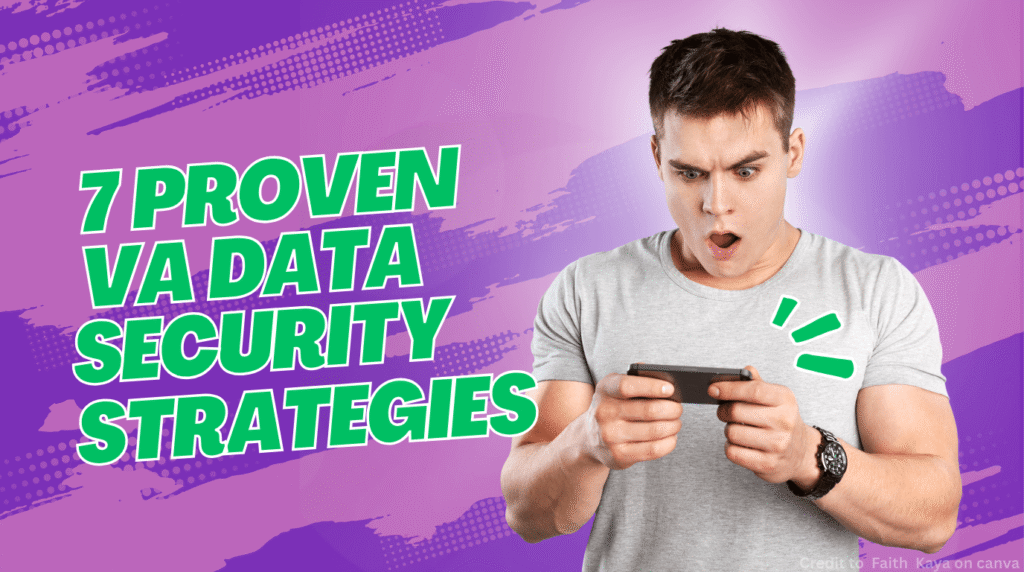There are no reviews yet. Be the first one to write one.
7 Proven VA Data Security Strategies to Safeguard Your Business in 2025
Introduction: Why VA Data Security Matters
Hiring a virtual assistant (VA) is one of the smartest moves for business growth, but it comes with one major question:
Am I protected? Every time you share passwords, client files, or financial data with your VA, you’re putting trust in someone who isn’t sitting in your office. That’s why VA data security is more than just a nice-to-have — it’s essential for protecting your reputation, clients, and bottom line.
Without safeguards, a single breach can lead to stolen information, lost clients, or even legal issues. But with the right strategies in place, you can confidently outsource tasks while keeping your business safe. Below are seven proven VA data security strategies that combine legal, technical, and practical measures to protect your confidential information.
7 Proven VA Data Security Strategies
1. Non-Disclosure Agreements (NDAs)
An NDA is the first line of defense in VA data security. Think of it as a written promise that your VA won’t misuse or share sensitive information. Beyond being a legal safety net, it sets expectations from day one. If you’re handing over access to your client database or marketing strategy, an NDA ensures that information stays within your business.
For instance, agencies like My BTLR and Virtually Priceless build NDAs into every client contract, so confidentiality is never left to chance. This small step signals professionalism and builds mutual trust right away.
2. Confidentiality Clauses in Contracts
While NDAs cover broad confidentiality, specific clauses in your contracts can address everyday scenarios. For example, a clause might require your VA to avoid using public Wi-Fi without a VPN, delete files after a project ends, or prohibit saving client data on personal devices.
These clauses close the gaps NDAs might leave open. They also give you leverage if your VA unintentionally mishandles data — you can point directly to what was agreed upon. It’s about being proactive instead of reactive.
3. Password Management & Controlled Access
Sharing passwords via email or text is like leaving your front door unlocked. Instead, use password management tools such as LastPass, 1Password, or Dashlane. These allow your VA to log in without ever seeing the actual password. If the working relationship ends, you simply revoke access with one click.


Another smart move is role-based access. For instance, if your VA is only generating reports from your CRM, give them “read-only” access rather than full admin rights. This reduces the risk of accidental errors or intentional misuse, while still letting them do their job effectively.
4. Encrypted File Sharing
Every file you email is vulnerable to interception. That’s why secure, encrypted file-sharing platforms like Google Workspace, Dropbox Business, or OneDrive are non-negotiable. Encryption scrambles data so that even if it’s intercepted, it’s unreadable without authorization.
Combine this with two-factor authentication (2FA). With 2FA, even if someone guesses your VA’s password, they’ll need a second verification step to log in. It’s a simple habit that dramatically reduces hacking risks.
Imagine two scenarios: one where you send your client list as an Excel file attachment, and another where it’s stored in an encrypted folder with restricted access. One is a potential liability; the other is professional-grade security.
5. Cybersecurity Insurance
Many business owners never consider insurance for data breaches, but it’s becoming a necessity. Cybersecurity insurance covers you if sensitive data gets leaked or hacked, protecting you from financial and legal fallout. Some VA agencies already carry policies that extend to their clients — a big plus when you’re evaluating who to hire.
Think of it like health insurance: you hope you never need it, but when something goes wrong, it’s invaluable. If your VA handles payments, client financials, or sensitive records, insurance isn’t optional — it’s smart risk management.
6. Firewalls and VPNs
Virtual assistants often work remotely, sometimes from public spaces. If they connect to your systems over an unprotected network, hackers can easily intercept data. That’s where firewalls and VPNs come in. A firewall acts like a gatekeeper, blocking unauthorized access, while a VPN creates a private, encrypted tunnel for data transfer.
Requiring your VA to use both ensures that even if they work from a coffee shop, your business data remains private. Without these protections, it’s like announcing your login details over a loudspeaker. With them, your information stays invisible to anyone who shouldn’t see it.
7. Regular Access Audits
Security isn’t something you set up once and forget. Over time, VAs accumulate access to tools, folders, and accounts. The danger comes when those permissions aren’t updated or removed. An old login left active is like leaving a window open in your house long after you’ve locked the doors.
Schedule quarterly access reviews. Make a list of all accounts your VA has access to, decide whether they still need them, and adjust accordingly. These small, regular audits prevent minor oversights from turning into major breaches. It’s not glamorous, but it’s one of the most effective habits for strong VA data security.
Frequently Asked Questions (FAQs) About VA Data Security
1. Do all virtual assistants need to sign an NDA?
Yes. Whether you’re hiring a freelancer or working with an agency, an NDA is the baseline for protecting sensitive information. It shows professionalism and sets legal expectations.
2. How do I securely share passwords with my VA?
Use a password manager like LastPass or 1Password. These tools allow your VA to log in without ever seeing or storing the actual password, making it safer than email or messaging apps.
3. What should I do if my VA leaves my company?
Immediately revoke all their access. Change or reset any passwords they had, remove them from shared folders, and update your access logs. This prevents accidental or intentional data misuse after offboarding.
4. How do I know if a VA agency takes security seriously?
Ask about their policies. Do they use NDAs by default? Do they require VPNs? Do they carry cybersecurity insurance? Agencies like SupportZebra highlight their security measures openly, which is a sign of credibility.
Conclusion: Building Trust With VA Data Security
Delegating work to a virtual assistant should give you more freedom, not more stress. By using NDAs, controlled access, encrypted file sharing, insurance, and regular audits, you create an environment where your data stays safe and your VA can work without unnecessary restrictions. The result? Trust. And trust is the foundation of every successful long-term working relationship.

Read next:
- VA Pricing Strategy 2025: How to Set Rates That Scale
- Scaling Your VA Business: Mistakes to Avoid in 2025
- VA Niches 2025: Proven Guide to Profitable Services
- How to Earn in Dollars as a VA: Step-by-Step Guide
Funnels. Emails. Courses. All-in-one & Free Forever — No tech headaches.
Start Free


